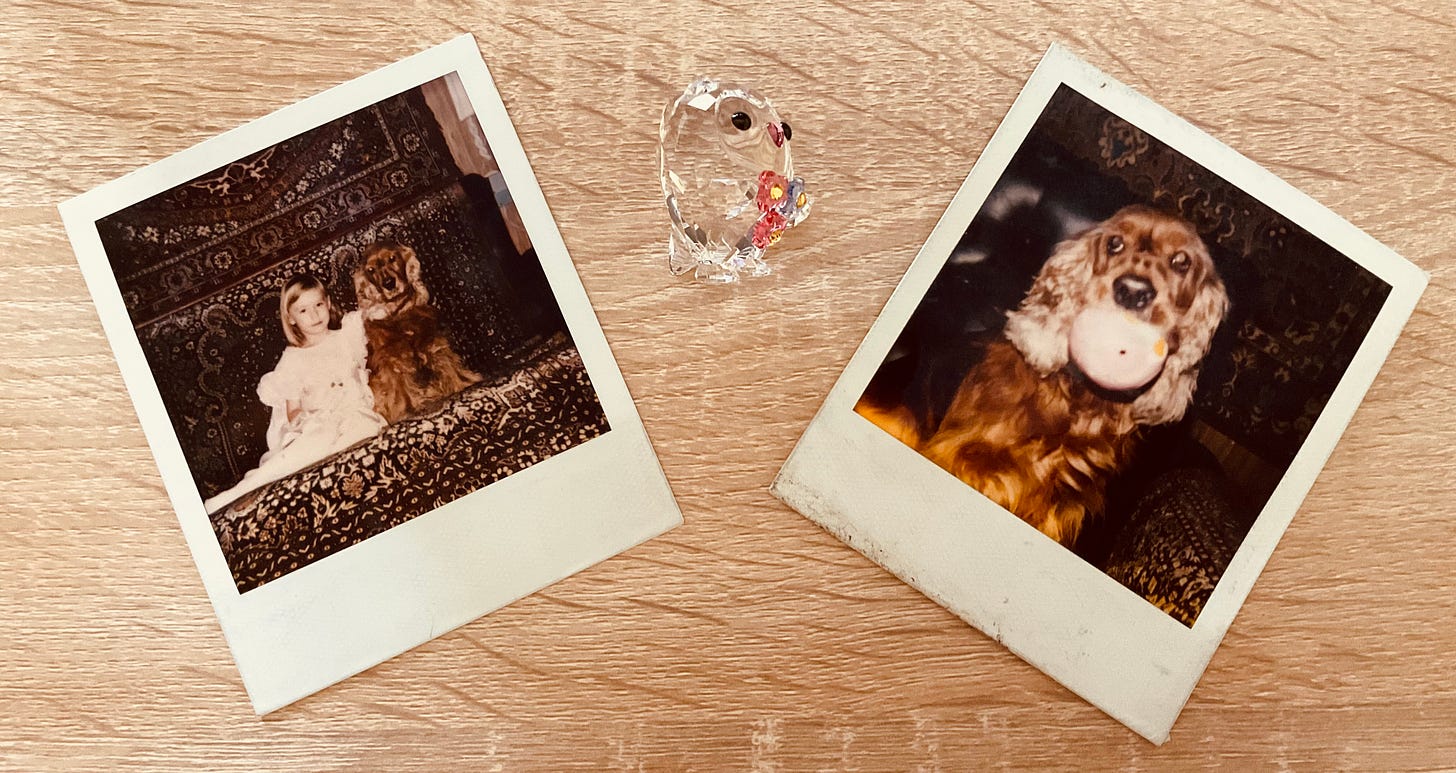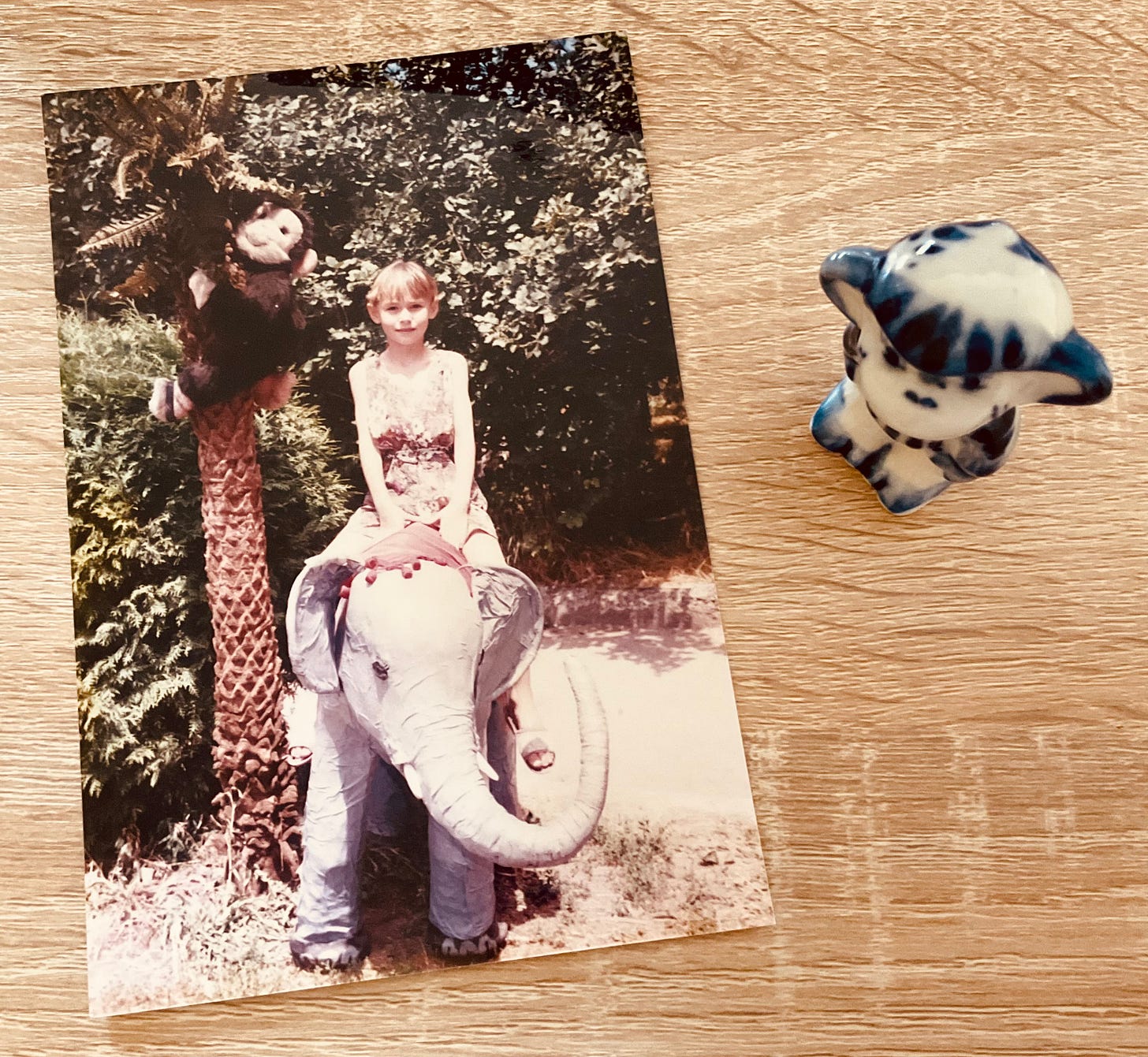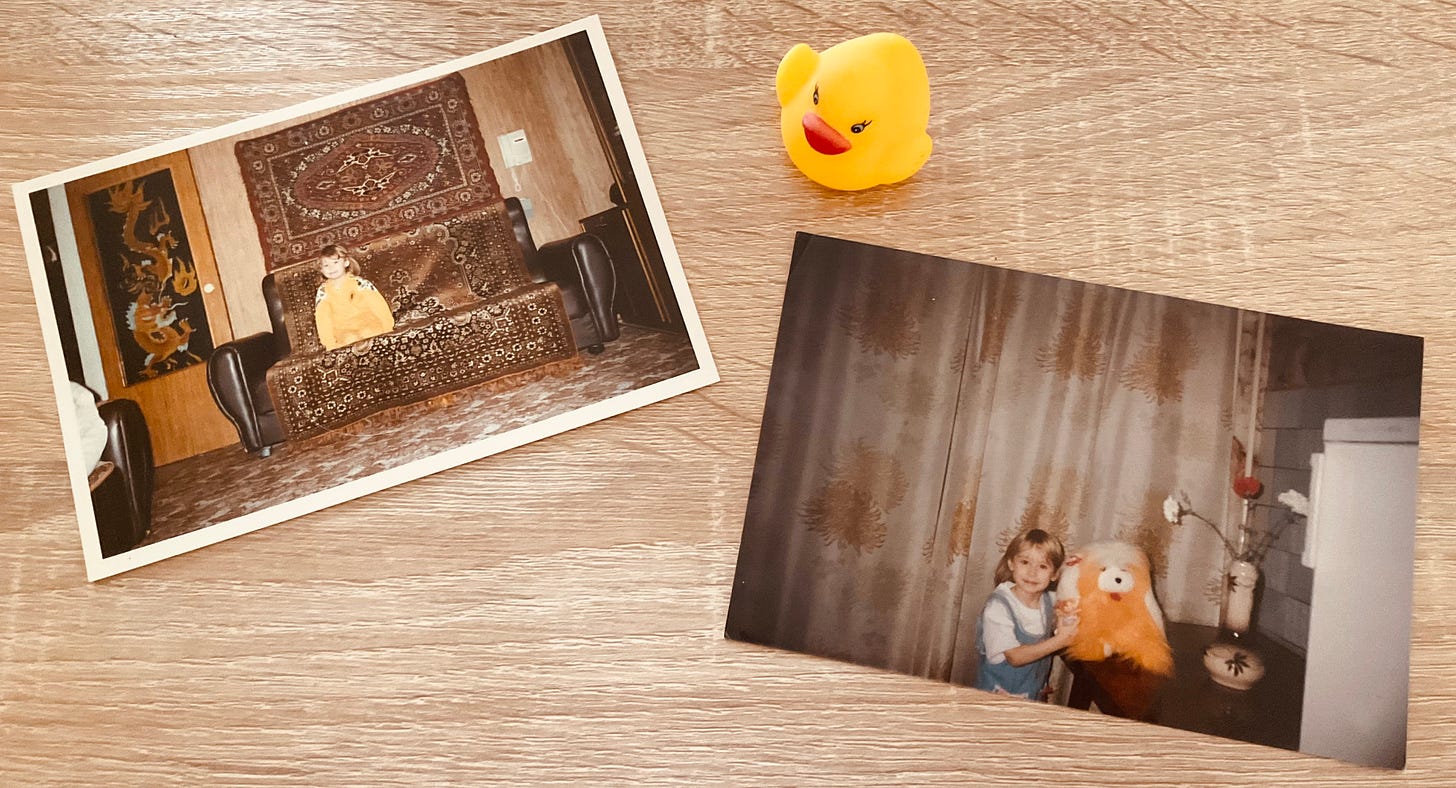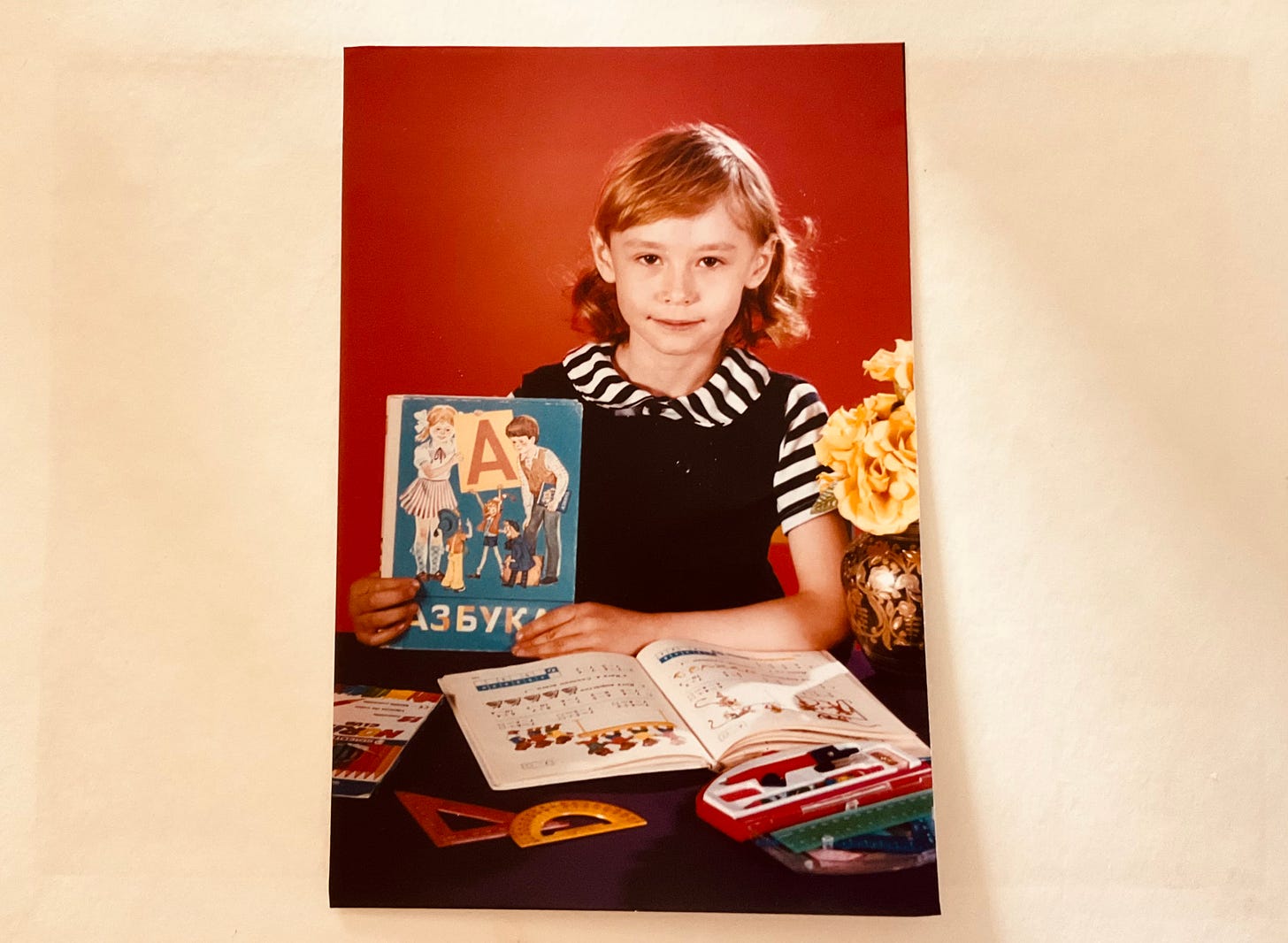Obligatory post-Soviet couch photo and other pictures of mini me
And how mini me and big me come together in different hopes
This post was inspired by Alex Dobrenko’s emotional piece “I was born in Odessa Ukraine.” When I saw his own childhood couch photographs, I wanted to also share my own. Which then led to a train-of-thought post leading somewhere and nowhere. Go read and subscribe to “Both Are True” if you want a hearty laugh and cry.
Dear hopeful reader,
Anyone born in a USSR country during the Soviet era, and after, is familiar with wall carpets and carpeted couches. Especially wall carpets—they had them or they had seen them. And now we laugh about it being a thing then, looking at our photographs of yore. The intricate wall decor wasn’t just for aesthetics, but for warmth, insulation, and privacy.
I was born in Kazakhstan two years prior to it becoming an independent nation. There, weaving traditional patterned carpets was a way of living for Kazakh women. Life was already difficult in any USSR state. But how disruptive it was when the Soviet Union fell and impacted so many dependent countries, regions, and people. Including, I imagine, the Kazakh women weaving the elaborate tapestries with love, care, mindfulness, and intention.
I’m honored to have a few photographs that captured the unique mosaics in our home then. Like in the picture above, where I sit in my favorite princess dress with the grumpy family dog, Flash. Flash was actually a sweetie pie, as seen in the second Polaroid. Interestingly, he wasn’t our first dog. Our first dog was stolen—my first big loss. And while we were searching for him, someone found Flash. We saw him and decided to keep him. If my memory doesn’t fail me, I remember he was growling the first day we had him. Later on, he warmed up to us, and even tolerated our newly acquired kitten, Martin.
Martin got to live with us through immigration to Canada and our move from Toronto to Montréal to Île des Sœurs and until he could no longer live. I remember how heartbreaking it was to witness our lifelong cat’s organs failing and to have to put him down. I must say, he had a character of a scoundrel, but I freaking loved him. Thinking of him now, I cry and miss him. He was one of my first portrait models. Speaking of which, I’ll post some pictures of Martin next time—and all the cats I ever loved and photographed. It will be a cat appreciation post.
Also read: “The Nuances of Pain and Soul,” a creative non-fiction piece on chronic pain
I was happy (and healthy!) in Almaty. But I think it’s because I was rightly sheltered from life’s hardships. I was loved and cared for by my parents, my grandparents, and family friends. Although I do remember missing my parents a lot. I recall they worked long hours. I got to see them briefly before going to school and when day turned night. I missed them even before they left the house. It felt like melancholy and yearning churned together. That feeling was embedded in me throughout life. When the door closed, and I was alone, I felt it, and I wanted them so badly to return. Anytime someone would leave, or I would leave, was like a goodbye forever.
But I wasn’t anything if not hopeful; my name is Надежда after all. I knew how to entertain myself and be entertained. I would lose myself in toys or pen and paper, impatiently awaited shows, and rewatched-too-many-times movies. I would lose myself in games and in my imagination. For hours and hours. Give me a dandelion and a stick and I would create a dolly out of it. Give me plastiline and I would make figures and a room for them to live in. Give me a ruler, a book, and a few plush toys and I would teach them how to read. Put on a song and I would sing it and dance to it all day long. No wonder I write today, as one of my creative endeavors. It’s in my DNA as much as it’s my passion.
Back to hope, and what it meant for me as a child and what it means for me today. You could see it in my grin then, unwavering. (Not the lived smile I have today. (My husband calls it the upside-down smile, or the bep—inside joke.)) I had infinity of hope within me. I wanted to give it away to as many people and as much as possible. Friends wondered how I could be so optimistic, and infectiously so. I knew how to make someone feel better when others stopped trying. I would stay until they did; I wouldn’t give up. We didn’t need to talk, just sit there together, and cry if need be. If someone was alone, no matter how annoying they were to others, I was a friend to them. I wanted to be a friend to all, especially the lonely, the vulnerable, even the chatterboxes.
What hope meant for me then was seeing the positives in any person. It meant to have faith that a negative situation will turn out for the best in the end. It meant to have hope in the future. It meant to be free, joyous, and lively. I’m still hopeful today, but reality also got in the way. Life chisels a person in all kinds of ways over time, leaves imprints, bad and good, on their body and soul. Losses, diseases, misfortunes, disappointments, and exhaustion tend to do that. I hope, but with a hefty dose of anticipation and skepticism. In health, career, projects, and such. I’m hopeful in others, but also, I take time to build relationships. I don’t have energy, time, and health to overextend myself; what matters is my family who have given me everything and the few friends who value and appreciate me. Hopefully, I pray for a positive future for my loved ones, for the world, for myself. It’s almost a whimper, the prayer.
It’s all right to have a changed perspective on your world, to be realistic and wise, to tread on the side of caution, to have forethought, to follow your gut. Life throws learning lessons at us so we grow and become well-rounded individuals, and keep evolving all through our lives. It’s also all right to be hopeful so we don’t figuratively drown ourselves from our sorrows, disillusionments, regrets, and failures. So the little spark of hope allows us to pick ourselves up from our fall and keep us moving forward as we stumble many more times. Balance is key. Maybe mini me and big me can settle on a sensible middle ground.
Also read: Photographs tell stories too
When my family and I took a brave leap to Canada, I cried for days. I didn’t understand why we moved across the pond when I personally was happy in Almaty. Years later I understood how democratically and economically corrupt Kazakhstan was, and there was no future for us there. I was rightly sheltered, as stated above, with love and care, but that’s not to say my family didn’t experience the challenges of Soviet and post-Soviet life. To this day, Kazakhstan is far from being free and fair. We could only wish to experience freedom and fairness in a country like Canada. Hard work and resolve paid off for my family.
It was still tough to adapt to a new nation, a new language, a new way of life. Rooting myself to a new soil became a nebulous experience, because we moved several times before we settled on Nuns’ Island. I couldn’t ground myself to anywhere with the recurrent changing of environments, homes, and schools. And guess what? I now live in New Jersey with my husband, having moved around with him here and there too many times than necessary. I’ve been in the States for almost 10 years, and I feel elusive as ever. I also hardly ever leave the house because of my chronic conditions, so my world is small.
But it’s also big. Being connected to the interwebs made it expansive. I know fascinating people from all kinds of parts of the globe. I can speak with my parents anytime. I can text a quick message to a friend states or countries away and hear back from them shortly. I can send a long email that will take me a month to write to someone, and it will most definitely be delivered. I can work from home in a company in a different state. I feel connected, even when I’m not, to family, friends, colleagues, and acquaintances.
So even if mini me and big me don’t understand, experience, or feel the concept of rootedness, I’m rooted in and to others, all over the world. It’s as if I’m moving from one space to another, while remaining stationary. I learned to accept this sensation, even appreciate it. It’s strange yet “perfectly splendid.”
As a child I loved learning but hated reading. Then I loved to read and hated to learn. From grade school to university, my relationship with studies and literature varied. Nonetheless, I studied hard. Even when I failed or barely passed, I persevered. I wanted to hold myself accountable for my work and be dependable for my peers for projects. Quality and commitment meant everything. My family instilled in me the spirit of responsibility and aspiration. That’s important to me today as well, if not more important.
Having physical limitations means I have to work harder to find fulfilling opportunities that accommodate my needs. To prove myself, I must to be creative. To gain experience unconventionally, I volunteer my time and effort. I search far and wide, I revise my strategies, I take risks in spite of my hesitations and challenges. I persist, I persist, I persist. I know it’s not for naught, that my ambition and effort will yield results, limitations or not. I take it as a challenge—a match with myself. And sometimes the universe grants me extra luck when the time is right for me.
Mini me was carefree, joyful, studious, well, and hopeful. Life shaped big me in unpredictable ways full of uncertainties and obstacles, but not devoid of love, beauty, happiness, peace, and fortune. Mini me pushes me forward, and big me pulls myself together. We co-exist in different hopes.
Yours hopefully,
Nadia










This was so beautiful to read! :)
This is really moving, Nadia, an ode to displacement and finding anchors in the heart and creativity when the world is constantly shifting. You've had such challenges! Your voice is both gentle and strong... :)